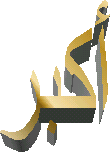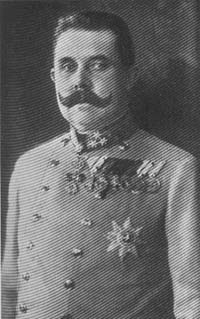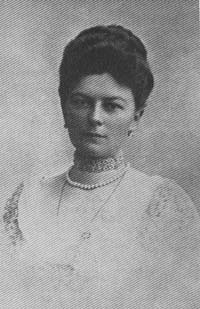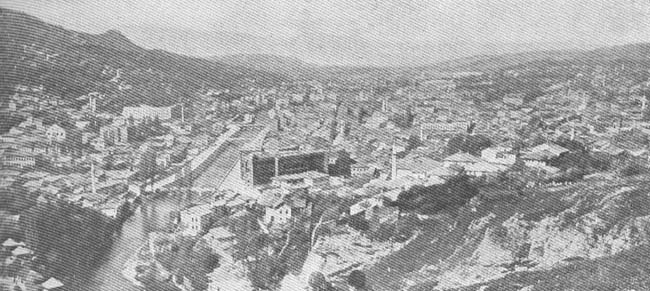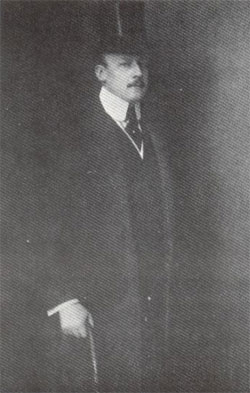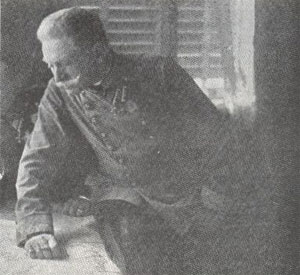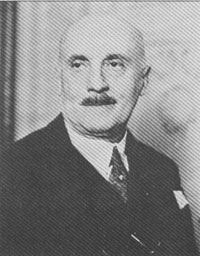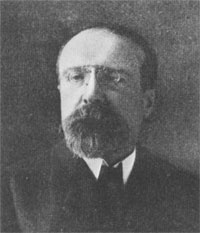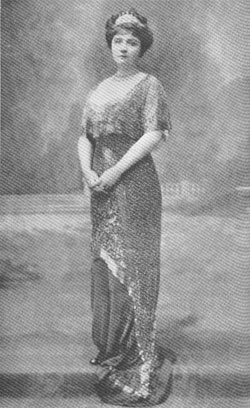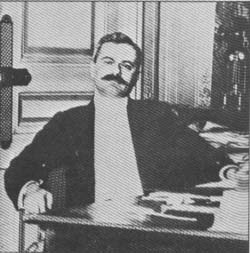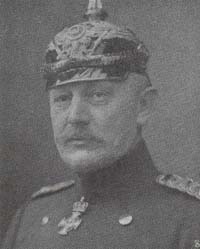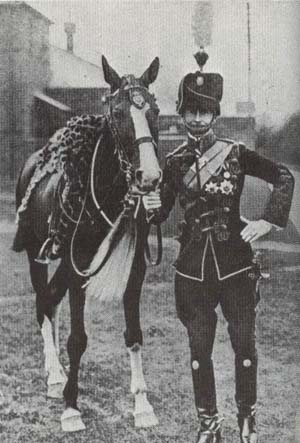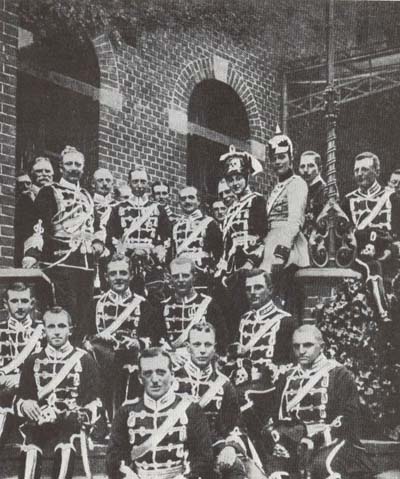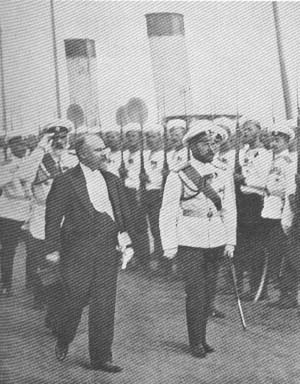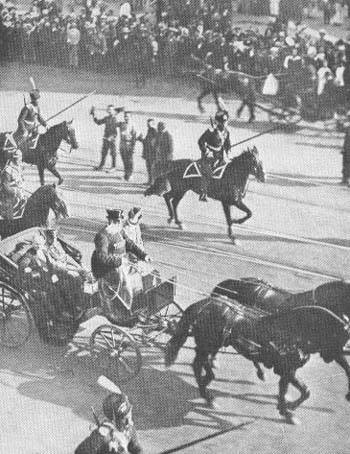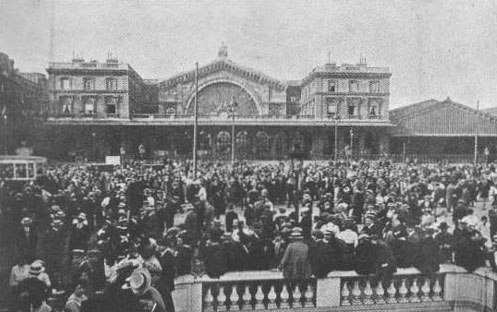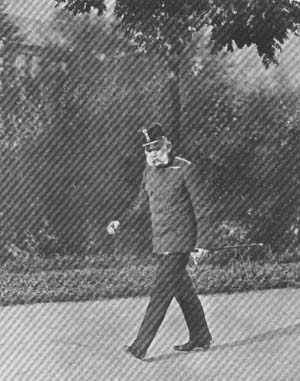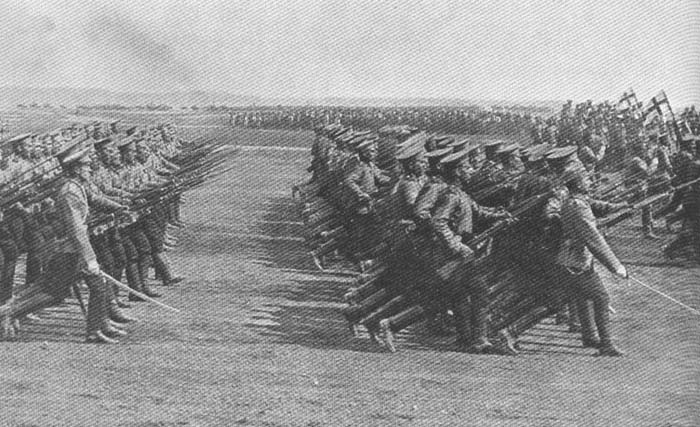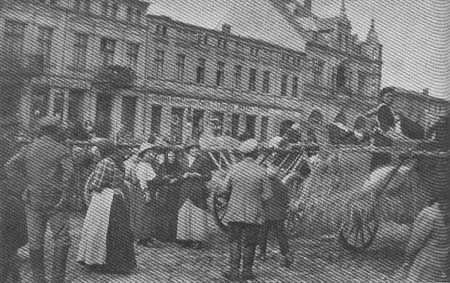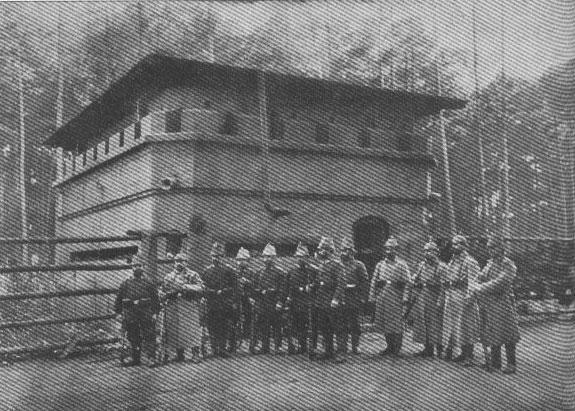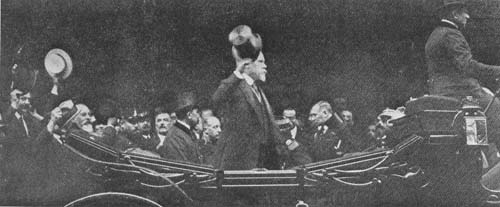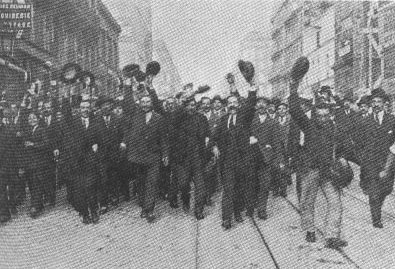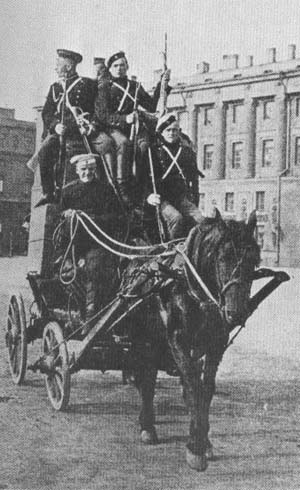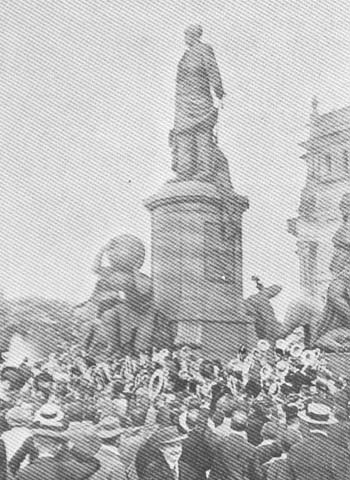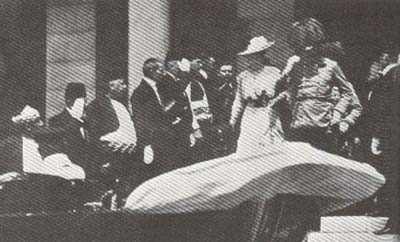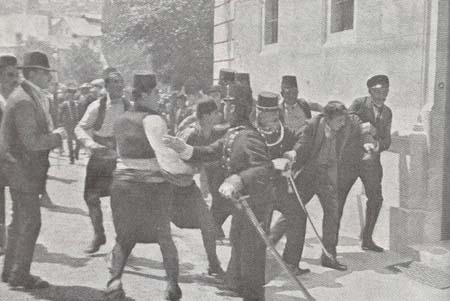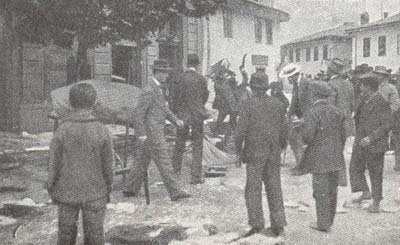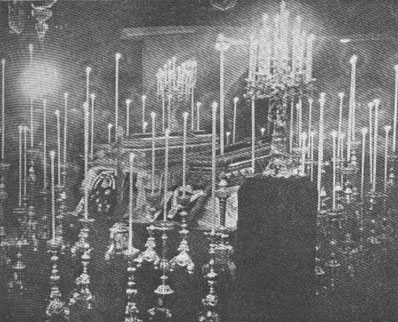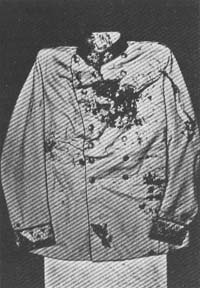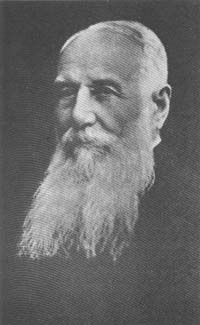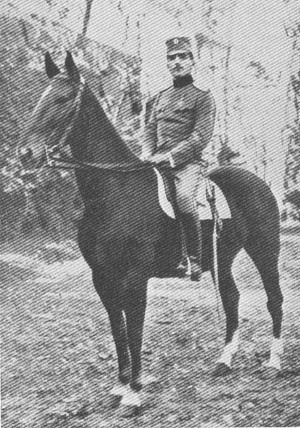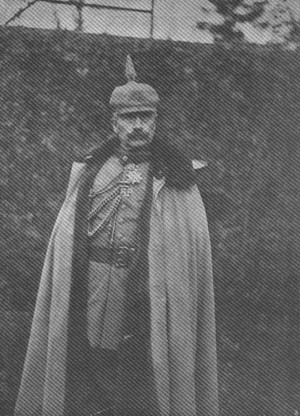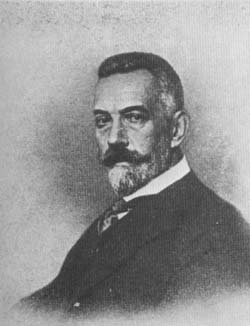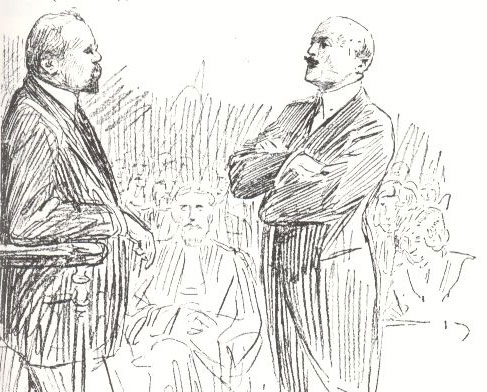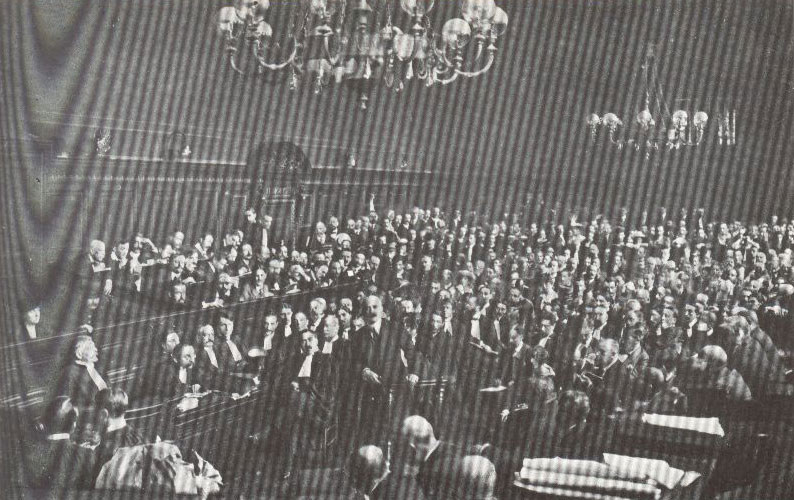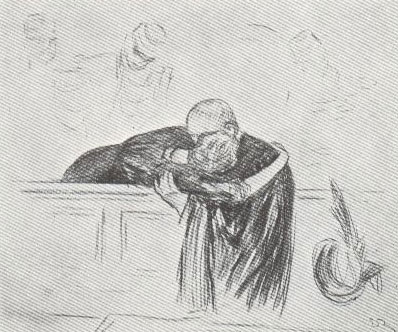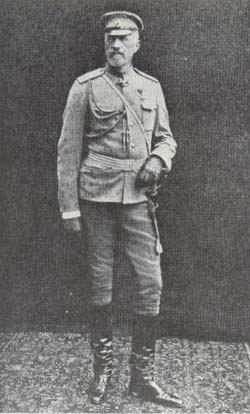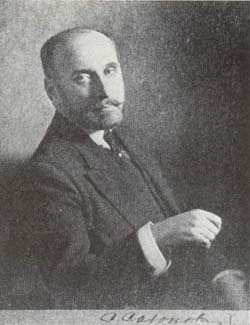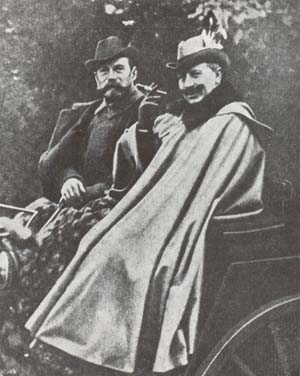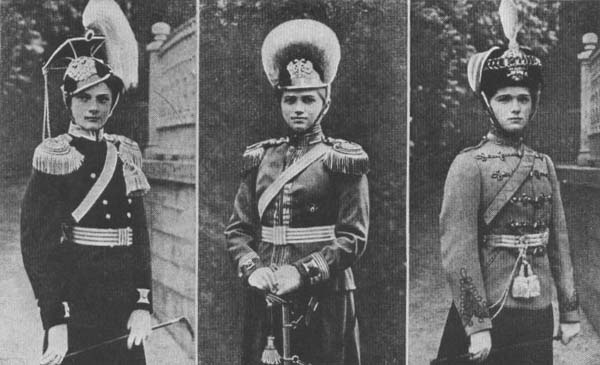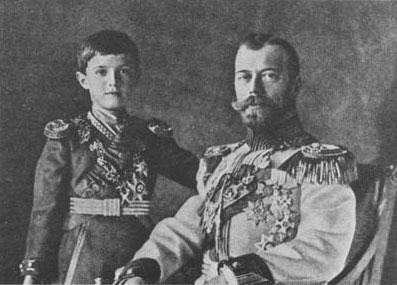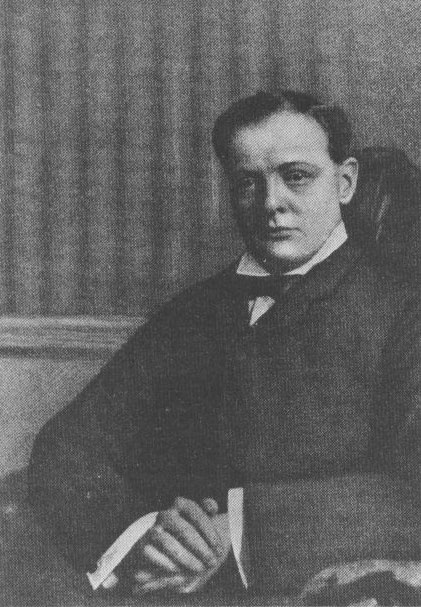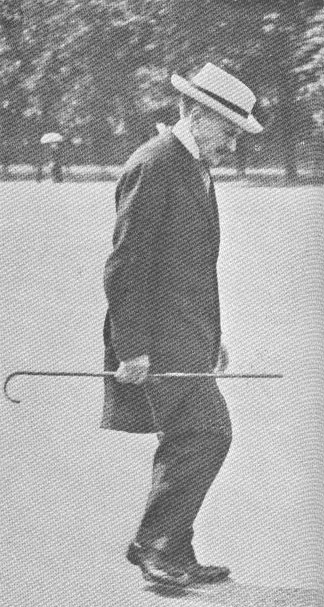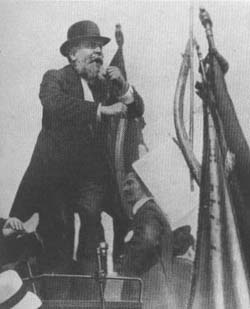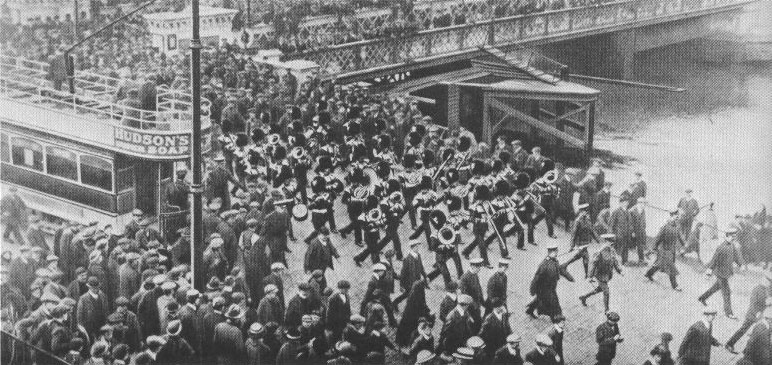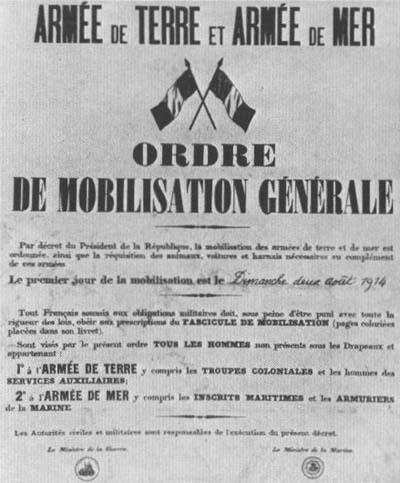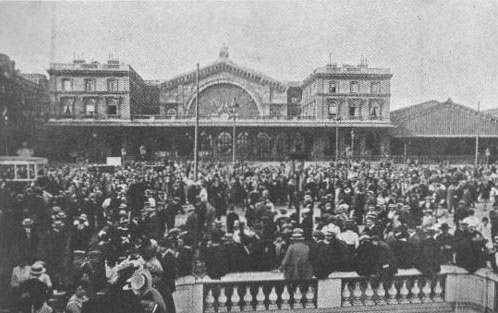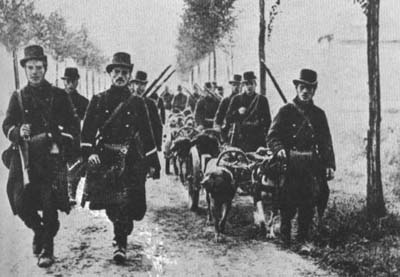|
|
 |
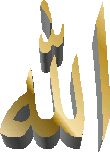 |

HOME
Leon Degrelle
Hitler,
born at Versailles
PHOTOS
|
Archduke Franz Ferdinand - Arrogant, humorless, the heir to the Habsburg throne was anything but a charismatic figure. His force of will and his widely acknowledged political acumen, however, won him respect in foreign capitals. |
Dutchess Sophie of Habsburg - A certain favoritism toward the Slavic peoples of the Austro-Hungarian empire was attributed to Archduke Franz Ferdinand. The Czech origins of his morganatic spouse Sophie, born the Countess Chotek of Chotkowa and Wognin, were doubtless a factor. |
|
View of Sarajevo at the beginning of the century - Liberated from the Turks in 1878 and entrusted to Austria-Hungary by the Treaty of Berlin, Bosnia-Herzegovina was annexed by the empire in 1908 to create a southern buffer. It was in this recently acquired territory, the strategic importance of which was underlined by the Balkan Wars of 1912-13, that the heir to the throne was traveling with no more protection than a justice of the peace at a county fair |
|
Franz Josef I, Emperor of Austria, King of Hungary - Enfeebled by age, clinging to the memory of his murdered wife Sissi, Franz Josef was above all devoted to maintaining the sacrosanct etiquette of the Viennese court. His sixty¬eight-year reign (one of the longest on record) was ill-starred, a long succession of bereavements and defeats. He died shortly before the final collapse of his empire. |
Leopold, Count Berchtold von and zu Ungarisch, Foreign Minister of Austria-Hungary from 1912 to 1916. A dandy with little taste for diplomacy, and less aptitude. |
|
General Conrad von Hoetzendorff, Chief of the Austro-Hungarian General Staff. |
Joseph Caillaux - One of the most talented European politicians of his generation, well in advance of his own time, he was moreover quite conscious of his own worth. His brittle pride made him many enemies, while his opposition to the war party made him still more. At the end of 1913 he toppled the government of Louis Barthou (below), Poincare's liege man (or vassal). That occasioned the press campaign waged against Caillaux by Le Figaro. |
|
Louis Barthou - His Pan-Slavist sympathies brought him anything but luck: he died in Marseilles in 1934, together wit h King Alexander of Yugoslavia, at the hands of Croatian autonomists. |
Henriette Caillaux - The revolver bullets which she fired, after being
pushed to the limit, at her traducer Calmette doubtless cost her husband the
French presidency, and by the same token gave Poincarê a free hand to plot |
|
Gaston Calmette, editor-in-chief of Le Figaro. The first corpse on the road to war. |
Helmuth von Moltke - Count,general, head of the German General Staff, but also a poet, a musician, and a philospher, who lost the war when he lost his nerve.
|
|
Carnival of princely families, the crown prince in the uniform of a colonel of hussars in the British Army. In those pre-1914 days people still believed in lace, chivalry in warfare, and the supranational ties between crowned heads. |
Wilhelm II and family wearing the uniform of the Death's Head Hussars. The ladies are there, too. Princess Viktoria-Luise preens in her shako, while the crown princess displays a stunning Pickelhatthe |
|
July 20th: Poincare is met by the tsar at the quay of the Peterhof. The French president — the only president to have played a role, a malign one in fact, during the Third Republic — had come to "warm up" the tsar, as he put it. |
July 21st: The two heads of state are taken by coach to St. Petersburg. But the important matters are settled in the tsar's absence, in secret meetings between Poincare and the Russian war party. |
|
July 22nd: Poincare's reception at Krasnoye Selo, where a great military review took place. The French president returned dazzled by the prospect of the coming victory. |
July 23rd: Franz Josef on holiday at Bad Ischl, on the clay of Vienna's ultimatum to Serbia. The trap had snapped shut on the emperor |
|
At Krasnoye Selo Poincard imagined he could see the splendid Russian army marching into Berlin. |
|
In East Prussia, the threat of Russian invasion becomes clearer by the hour: the German population has already begun to evacuate the frontier districts. |
German strong-point on the border dividing East Prussia and Russian-ruled
Poland. On the other side of the frontier prepar |
|
July 29th: Poincare, after leaving Dunkirk early that morning, arrives at the Gare du Nord in Paris, |
where he is welcomed by crowds cheering the imminent war. The president feigns innocence, but the demonstrators exhibit no such modesty; they know that the hour of revenge has struck at last. |
|
No contraption, no matter how motley, was too outlandish to do service in the tumultuous Russian mobilization. |
Students demonstrate their support for the motley, was too outlandish
to do Fatherland in front of the Bismarck service in the tumultuous Russian
monument in Berlin. The emotions of the |
|
The Archduke and Dutchess leave the Sarajevo city hall to ride to the hospital in which U. Merizzi, wounded by the bomb thrown by Chabrinovich, is being treated. Franz Ferdinand and Sophie have only a few minutes to live |
The Arrest of Princip - Barely saved from a lynching, the assassin is taken away by the police. A minor, he was not executed, but died in prison of tuberculosis shortly before the end of the war he had done so much to unleash. |
|
Anti-Serb Riot - The news of the double murder set off a wave of violence pitting Croatian and Bosnian loyalists against Serbs suspected of sympathizing with the Belgrade government (opposite: the looting of a Serbian house in Sarajevo, the afternoon of the assassination). |
The candle-bedecked chapel in Vienna where the murdered couple lay in state. |
|
Uniform jacket worn by Franz Ferdinand.
|
Nikola Pashieh, Serbian Prime Minister - Notable for his lack of scruples, this remarkable figure devoted his life to one goal, toward which he strove with all manner of ex¬pedients and tortuous ruses: to ensure his perennial leadership of the Serbian government. |
|
Crown Prince Alexander of Serbia - Son of Peter I Karageorgevich (the adventurer who became king of Serbia through a bloody palace revolution), Alexander took after his father. Prince-regent at the time of the assassination in Sarajevo, due to his father's illness, he was implicated in the crime by much of the evidence. After becoming king of Yugoslavia in 1921, he was cut down by bullets fired by Croatian autonomists at Marseilles in 1934, a fittingly ironic end. |
Germany, King of Prussia - The William II of Hohenzollern, Emperor of Kaiser was nothing more, really, than a sort of imperial Colonel Blimp: the same theatrical poses, the same same fundamental invective, and the extravagance in lack of real malice. It is time that justice was done to this monarch, so often vilified, who was nevertheless one of the few heads of state to try to preserve peace in July 1914. |
|
Theobald von Bethmann-Hollweg - Chancellor from 1909 to 1917, he earned his place in history for having successfully reconciled the German Social Democrats to the Reich, and for having promoted the most advanced system of social benefits of the era. These successes, however, were overshadowed by his setbacks in foreign policy. Clumsy, overtaken by events, he was embroiled in a French-German¬Russian war in spite of himself. To the question, "How did we come to this pass?," he could only answer sadly, "If I only knew . . ." |
Two former presidents of France come face to face as opponents in the trial: Barthou and Caillaux. |
|
A big trial, uniquely Parisian. On the witness stand (center), Joseph Caillaux. In the dock (far left), his wife. |
|
The jurors proved sympathetic to the distress of the accused caused by Figaro's campaign. Acquitted! Hcnrictte Caillaux collapses in the arms of her attorney. |
Grand Duke Nikolas Nikolayevich, the tsar's uncle and leader of the Pan Slavist faction in the military, who manipulated the Serbs with a view to seizing the Balkans and Constantinople. |
|
Sazonov, Russia's duplicitous foreign minister, a wily operator who lured Austria-Hungary into a trap. |
The Russian tsar and the German Kaiser were united by a warm mutual sympathy. Wilhelm II tried desperately, at the last minute, to win over his cousin Nicholas II, brave chap whose willpower failed him. |
|
Grand Duchesses Olga, Maria, and Tatiana of Russia The three elder daughters of the tsar took part wholeheartedly in the festivities held in Poincares honor during his visit to Russia. These pretty girls had no inkling that the merry-making would be followed by war, defeat, and revolution. For them there would be imprisonment and then massacre. |
|
Tsar Nicholas II with his son, the Tsarevich Alexis A solitary and ineffectual autocrat, the Tsar of all the Russias was sweetness personified. He was unable to stand up to the pressure of the imperialist, Pan-Slavist clique, which wrung from him the mobilization order which unleashed the war. |
Winston Churchill - His face prematurely marked by alcoholism, this terribly ambitious man was in 1914 one of the most active supporters of a war against Germany. |
|
Prince Lichnowsky, Germany ambassador to London, photo¬graphed while leaving one of his last meetings with Sir Edward Grey. His evident dejection leaves no doubt that war is now certain. |
Jean Jaurès - The great socialist tribune of the people, last French obstacle to war, was assassinated on July 31, on the eve of the French government's order to mobilize. |
|
Onlookers in London applaud the Irish Guards as they march by to the accompaniment of their band. |
|
|
The fateful notices appear in every town and city of France, and reservists swarm to Paris's East Station. The curtain is rising on the grand slaughter. |
|
The ultra-modern Belgian Civil Guard. |
|
|
Paris, Saint Francis Xavier Square - last inspection before the big sendoff. It can be reported that not so much as a gaiter button is out of place for the war. |
-
Who is Leon Degrelle ?
|
